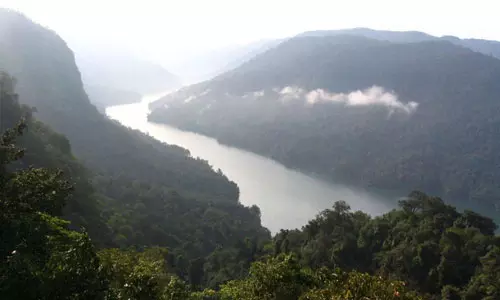
Sharavathi power project: Protests swell; public hearing sees huge response
Thousands of people in two districts gather to oppose the 2,000 MW hydroelectric project; govt says it is a must for rising energy needs

The Sharavathi Valley in Karnataka is rising against a massive power project which is threatening its ecosystem, biodiversity and its populace.
The proposed Rs 10,000-crore Sharavathi Pumped Storage Project (PSP) in Karnataka is a 2,000 MW hydroelectric scheme that has become a flashpoint between the government's push for clean energy and environmental conservation.
Two back-to-back public hearings saw an unprecedented turnout of locals, farmers, students, scientists and environmental activists, with the number reportedly exceeding 10,000. While the first hearing, held on September 16 in Kargal (in Shivamogga district), drew a good response, the organisers claimed that the second hearing in Gerusoppa, in Uttara Kannada district, had a crowd of over 10,000 people, reflecting the growing public outrage.
Hailing the turnout, Akhilesh Chipli, an environmentalist based in Sagar, said it showed a strong sign of resistance.
“The turnout was overwhelming, with nearly 10,000 people attending the second hearing — a clear sign of people's anger. The government was forced to set up nearly 75 special counters to receive objections. Over 7,000 individual applications have been submitted, apart from online submissions. I am seeing such a massive gathering for a cause in this region for the first time. Come what may, we won't budge,'' Akhilesh Chipli told The Federal.
What the project aims at
As one of India's biggest pumped storage facilities, it aims to use surplus electricity from renewable sources (like solar or wind) to pump water from the lower Gerusoppa reservoir to the upstream Talakalale reservoir. When electricity demand is high, the stored water would be released back down, generating power.
During the mandatory hearings, protesters accused the state government of pushing the project ahead without necessary safeguards. They also said the Karnataka Power Corporation Ltd (KPCL) — proponent of the 2000 MW project — is hiding crucial details to avoid public anger.
Also read: Great Nicobar project an 'ecological disaster': Sonia Gandhi slams Centre
According to officials, the facility is critical to meeting Karnataka’s renewable energy storage requirements.
Rare wildlife under threat?
But activists, researchers and villagers, who attended the meetings, were not convinced. They said the project, set to come up inside the Sharavathi Valley Lion-Tailed Macaque Sanctuary, would endanger rare wildlife, including the endangered primate after which the sanctuary is named. They also demand that the detailed project report and the full environmental impact assessment be released in Kannada for public scrutiny.
Also read: Twin tunnel project: How it will reduce travel time between Kozhikode and Wayanad
NBWL conditions flouted: Critics
Environmentalists also alleged procedural lapses, pointing out that the National Board for Wildlife (NBWL), the top body in matters related to wildlife policy, had earlier raised concerns before giving in-principle approval with nearly 30 conditions.
According to the critics, those conditions were overlooked, and the PSP was being rushed through despite an incomplete appraisal process.
Also read: NilgiriScapes 2025 to address challenges Nilgiri Biosphere Reserve faces
KPCL defends project
KPCL officials defended the project plan at the hearing, saying its design would have minimal surface disturbance and avoid large-scale submergence. They also claimed that compensatory afforestation measures and wildlife management plans would mitigate adverse impacts, if any. State officials said that Karnataka urgently needs storage projects to balance its expanding solar and wind-power capacity.
Local villagers, however, remained scared of potential displacement, disruption of livelihoods and loss of access to forest resources.
Also read: How India’s Sacred Groves are protecting biodiversity in a time of ecological crisis
Gurudatta Hegde, the deputy commissioner of Shivamogga, who presided over the first hearing, assured the residents that all their objections would be recorded and forwarded to the Centre.
KPCL not transparent, says former minister
Former minister Hartal Halappa slammed KPCL, alleging that the company has not been transparent about the land required for the project. Halappa pointed out that the KPCL has remained silent on the amount of forest and private land needed for both the pump house and the power lines.
He explained, "To pump water from Gerusoppa to Talakalale, more than 2,000 MW of power is required. The KPCL must cut down trees to ensure this power supply. Likewise, to carry the 2,000 MW of power that the project would generate to Bengaluru, the KPCL would have to lay new power lines, which would require hundreds of acres of land."

